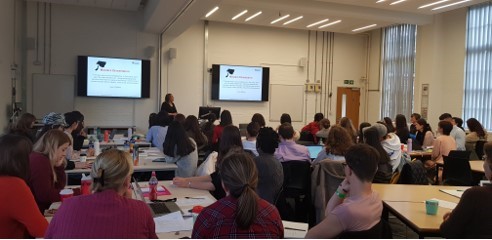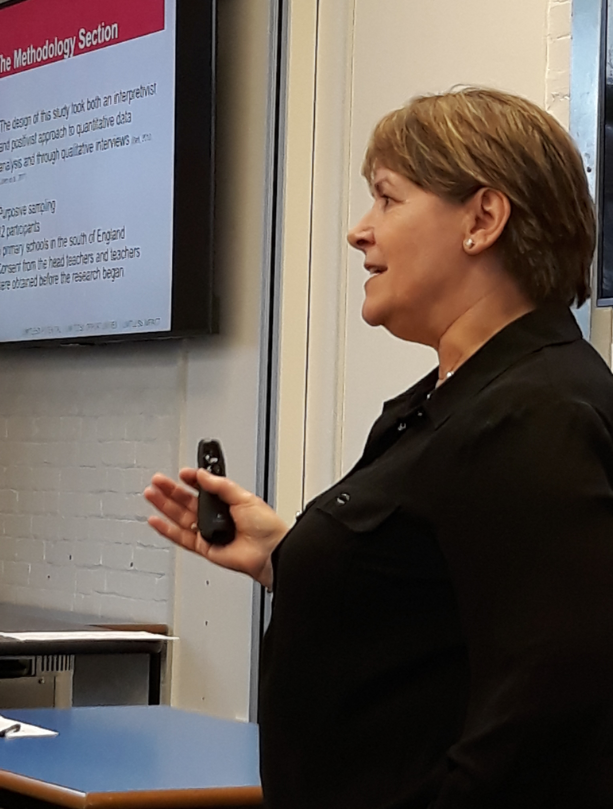This news item is written by Dr. Rebecca Berkley (Deputy Director of the MA in Education programme, and Co-Convenor of the EDM133 MA Dissertation module)
One of the challenges of writing a Masters dissertation is that you don’t know how to write it until you’ve written it, and by then it’s too late because you’ve finished it. The Institute of Education (IoE) held the first Masters Dissertation Conference on 30th October 2019 to support students who are embarking on this challenge.

The aims of the conference were to give students a good understanding of the whole task in writing a dissertation, to get them started on choosing their research topic, and to encourage students to meet others on the programme. The intensive, individual study that a dissertation requires can be isolating for students, so it’s really important for them to know that they are not alone in this process.
The conference opened with keynote presentations from Dr. Holly Joseph and Prof. Alan Floyd. Dr. Joseph introduced students to ‘Hot Topics in Educational Research’ with particular reference to the wide and varied interests and publications of IoE staff. We always encourage students to pick topics that relate to areas of staff interest so that they can get the best support from their supervisor. Prof. Floyd discussed what is distinctive about Masters level education research and reviewed how the researcher collected data and draws conclusions from educational research. He pointed out to students that Masters research should be critical in the way that the research engages with big ideas and theories, but does not need to be original. A well-structured focused research project organised around some pragmatic choices of what kinds of data the researcher can collect will often lead to a successful dissertation. This led to the first open discussion session where students reviewed topics of interest in research, many drawing on interesting problems from their professional practice as teachers and educators.

Three Masters alumni gave presentations in the second part of the conference, reporting on their experience of writing their dissertations and sharing the highs and lows of the journey:
- Jiayi Zhao spoke about Multiple roles, conflicting responsibilities and the personal and professional choices made by women in higher education leadership in China, a project which led to her publishing an article with her supervisor Karen Jones, and progressing to doctoral study at the IoE. Jiayi’s top advice to students was to keep on making progress, even in tiny steps.
- Laura Ogilvie, who was a part time student studying alongside a full time job as a primary teacher presented on gender identities in male teachers. Her talk was entitled I bet you want to be a headteacher in five years, don’t you? All male teachers do and she described the life history qualitative analysis she employed to examine the lived experience of these teachers. Laura’s top tip to students was to read as much as possible on the topic, and make sure to keep good records of references from the outset.
- Stephanie Sharp presented on To what extent is Q-methodology successful in capturing primary school teachers’ perspectives of subjective emotion feelings in the workplace? examining how this data analysis tool could be used to articulate teachers’ feelings about their own workload, and to make them aware of their own shifting opinions and thought processes. Stephanie advised students to keep talking to their supervisors throughout the process, as she found that these conversations helped her realise what her research focus was and helped her stick to this focus as her work developed.
Students were then able to ask questions of these presenters, which ranged from questions about coping with the workload of a dissertation to how to select an appropriate methodology for their chosen topic. These points will be picked up in the EDM133 group seminars with full-time and part-time students which take place throughout the academic year.

A dissertation is a chance for a Masters student to take their first steps as an education researcher. Many of our students choose topics relating to their professional lives, and we know that this research informs their practice. We look forward to seeing how the projects develop over the academic year.
